Why Did Kadru Curse Her Own Sons? The Untold Story Behind a Mother’s Rage
Noopur Kumari | Jul 24, 2025, 16:06 IST
( Image credit : Times Life Bureau )
In the vast ocean of Indian mythology, some stories are quietly tucked away yet carry powerful lessons about human nature. One such tale is that of Kadru, the mother of serpents, and the devastating curse she placed on her sons. But why would a mother do such a thing? What was so unforgivable that it tore apart a mother’s love? This article unravels the dramatic story behind Kadru’s curse and explores how deception, ego, and blind obedience can destroy even the strongest bonds. If you're drawn to untold mythological stories with deep emotional lessons, this is one you shouldn’t miss.
A mother’s curse powerful, rare, and always rooted in deep pain. In Indian mythology, Kadru, the mother of serpents (Nagas), is known for doing the unthinkable: cursing her own children. This story, buried in the verses of the Mahabharata, is not just about gods, serpents, or curses it’s a mirror to human ego, deception, and the consequences of blind loyalty. At its heart, it is a tragic tale of how even divine relationships can break when truth is sacrificed for personal victory.
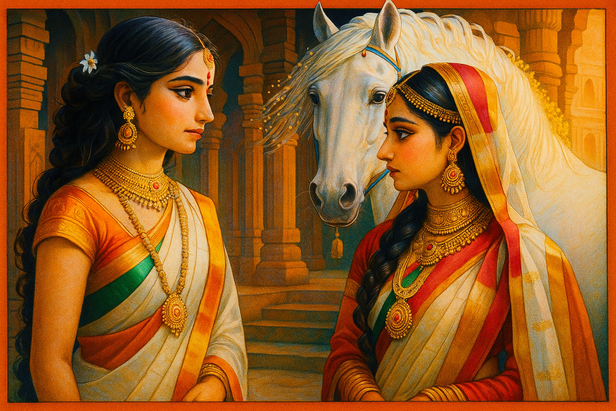
Kadru and Vinata were both wives of Sage Kashyapa. While Kadru gave birth to a thousand serpents, Vinata bore Aruna and Garuda. Despite being sisters, a deep jealousy grew between them, especially after Vinata was prophesied to give birth to sons greater than Kadru’s. One day, both sisters saw the divine horse Uchchaihshravas, who emerged from the Samudra Manthan. Kadru claimed the horse was black in tail, while Vinata insisted it was white throughout. They made a wager the loser would become the other's slave. But Kadru, fearing defeat, chose deceit over truth a decision that would curse her forever.
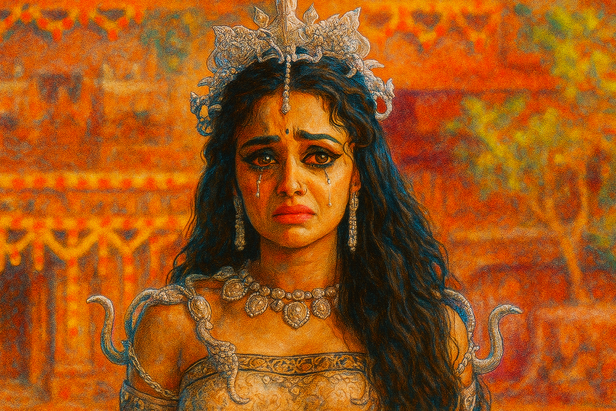
Kadru ordered her sons the Nagas to cover the horse’s tail, making it appear black, so she could win the bet. Some of her serpent sons, however, refused. They believed in righteousness and didn’t want to be part of a lie, even for their mother.
This refusal wasn't rebellion it was truth over blind loyalty. But Kadru, clouded by ego and the fear of losing to Vinata, saw this as betrayal. In a fit of rage, she cursed her disobedient sons to burn in the fire of the Sarpa Yajna a mass snake sacrifice that King Janamejaya would later initiate.
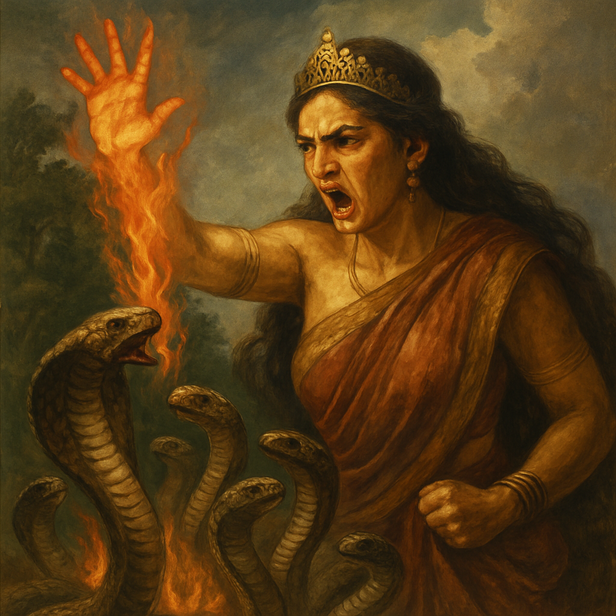
Kadru’s curse was not just divine anger it reflects a universal struggle: Should a child obey a parent even when they’re wrong? The serpents’ refusal was a moral stand, not defiance. They stood for truth, justice, and dharma, values highly regarded in Indian philosophy. This moment echoes a deeper lesson: True obedience lies in upholding truth, not pleasing authority blindly. Kadru’s inability to accept this cost her the loyalty of her children and eventually led to their doom.
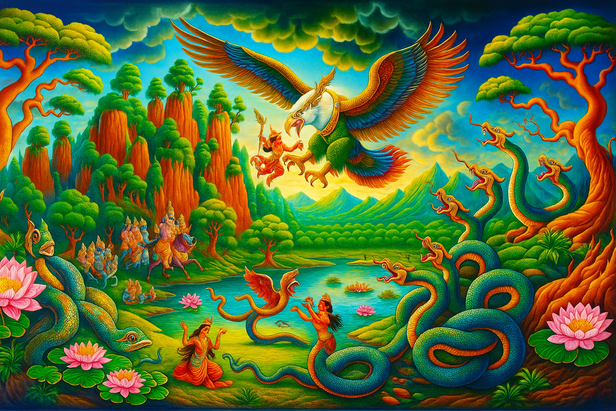
Kadru’s curse wasn’t empty. Years later, King Janamejaya, seeking revenge for his father's death by a snake bite, began a great serpent sacrifice the Sarpa Satra. The cursed Nagas were drawn into this fiery fate. Had Kadru chosen compassion and accepted the outcome of the wager gracefully, perhaps the future of the Nagas would have been different. But her decision that day shaped the destiny of an entire race of divine beings. It’s a warning from mythology: A moment of ego can burn generations.
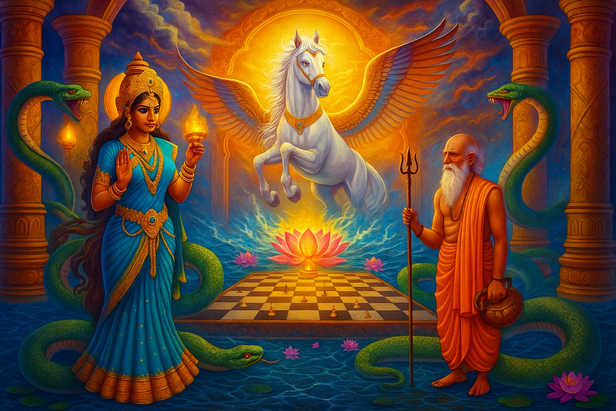
What could hurt more than watching your own children suffer? Yet, Kadru’s story is not of cruelty it’s of a mother consumed by pride and the need to win. She believed her sons’ disobedience was personal betrayal, not moral courage. In choosing ego over empathy, she lost the very children she bore and nurtured. In a modern sense, her tale reminds us: Love without understanding becomes control. Authority without compassion becomes tyranny. Even the divine are not immune to emotional blindness.
The story of Kadru and her cursed sons is not just a myth it's a timeless emotional parable. It shows how ego, pride, and blind authority can shatter even sacred bonds. Kadru’s curse wasn’t just the end of her sons it was the beginning of her own guilt and regret. The very fire she ignited burned the legacy she had built. Today, in families, friendships, and society, we still see reflections of this tale. When truth is sacrificed for winning, when obedience is demanded at the cost of justice, the Kadru within us speaks. But mythology doesn't just narrate it warns. And if we listen closely, we won’t repeat the mistakes of gods.
Explore the latest trends and tips in Health & Fitness, Spiritual, Travel, Life Hacks, Trending, Fashion & Beauty, and Relationships at Times Life!
1. The Ego Clash: Kadru vs. Vinata

Kadru,
( Image credit : Times Life Bureau )
Kadru and Vinata were both wives of Sage Kashyapa. While Kadru gave birth to a thousand serpents, Vinata bore Aruna and Garuda. Despite being sisters, a deep jealousy grew between them, especially after Vinata was prophesied to give birth to sons greater than Kadru’s. One day, both sisters saw the divine horse Uchchaihshravas, who emerged from the Samudra Manthan. Kadru claimed the horse was black in tail, while Vinata insisted it was white throughout. They made a wager the loser would become the other's slave. But Kadru, fearing defeat, chose deceit over truth a decision that would curse her forever.
2. A Mother’s Deception: Forcing Her Sons to Lie

Kadru ordered her sons
( Image credit : Times Life Bureau )
Kadru ordered her sons the Nagas to cover the horse’s tail, making it appear black, so she could win the bet. Some of her serpent sons, however, refused. They believed in righteousness and didn’t want to be part of a lie, even for their mother.
This refusal wasn't rebellion it was truth over blind loyalty. But Kadru, clouded by ego and the fear of losing to Vinata, saw this as betrayal. In a fit of rage, she cursed her disobedient sons to burn in the fire of the Sarpa Yajna a mass snake sacrifice that King Janamejaya would later initiate.
3. When Obedience Is Not Always Noble

Kadru's Divine Curse
( Image credit : Times Life Bureau )
Kadru’s curse was not just divine anger it reflects a universal struggle: Should a child obey a parent even when they’re wrong? The serpents’ refusal was a moral stand, not defiance. They stood for truth, justice, and dharma, values highly regarded in Indian philosophy. This moment echoes a deeper lesson: True obedience lies in upholding truth, not pleasing authority blindly. Kadru’s inability to accept this cost her the loyalty of her children and eventually led to their doom.
4. The Curse That Shaped Naga Destiny

Naga Destiny
( Image credit : Times Life Bureau )
Kadru’s curse wasn’t empty. Years later, King Janamejaya, seeking revenge for his father's death by a snake bite, began a great serpent sacrifice the Sarpa Satra. The cursed Nagas were drawn into this fiery fate. Had Kadru chosen compassion and accepted the outcome of the wager gracefully, perhaps the future of the Nagas would have been different. But her decision that day shaped the destiny of an entire race of divine beings. It’s a warning from mythology: A moment of ego can burn generations.
5. When a Mother’s Love Is Overpowered by Ego

Kadru
( Image credit : Times Life Bureau )
What could hurt more than watching your own children suffer? Yet, Kadru’s story is not of cruelty it’s of a mother consumed by pride and the need to win. She believed her sons’ disobedience was personal betrayal, not moral courage. In choosing ego over empathy, she lost the very children she bore and nurtured. In a modern sense, her tale reminds us: Love without understanding becomes control. Authority without compassion becomes tyranny. Even the divine are not immune to emotional blindness.
A Lesson Carved in Fire
Explore the latest trends and tips in Health & Fitness, Spiritual, Travel, Life Hacks, Trending, Fashion & Beauty, and Relationships at Times Life!
